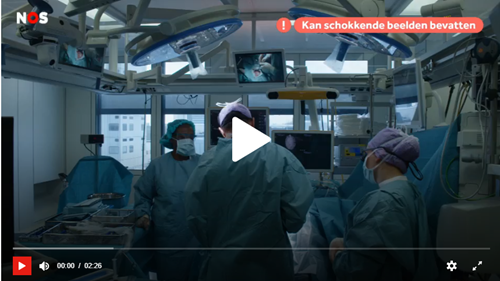In the Netherlands, it is expected that 195,000 people will be diagnosed with heart failure in 2025, leading to a high number of hospitalizations and deaths. Atherosclerosis is a disease in which plaque builds up inside arteries.
If plaque ruptures in an artery linked to the brain, this can lead to stroke. In neurology, brain tumors are also a large threat. In the Netherlands alone, more than 1,000 patients were diagnosed with a brain tumor in 2018.
Renewing ultrasound techniques will open doors for a whole range of diagnostic and therapeutic possibilities in the cardiovascular and neurological field. The Medical Delta program Ultrafast Ultrasound for the Heart and Brain offers excellent opportunities to tackle the major existing and evolving healthcare threats.
The program focuses on three healthcare threats: heart failure, atherosclerosis and neurological disorders.
Ultrasound
Ultrasound is the most commonly used medical imaging technique. It is harmless, relatively cheap and, because it uses real-life images, it gives immediate diagnostic feedback. The technology is developing rapidly: new ultrafast imaging brings the functioning of the heart and brain directly into view, and special contrast agents make new diagnoses and treatments possible.
Technological developments
Three technological developments are expected to have an impact in this field. The first is ultrafast ultrasound imaging, involving thousands of images per second. This makes the blood flow in the heart and through organs and even the activation of brain parts directly visible ("functional ultrasound").
The second focuses on the realization of new sensors, making ultrasound into a truly 3D modality. At the moment, almost all applications show a 2D visualization; this creates a limitation for treatment. In this program, 3D image reconstruction will be used, to improve diagnosis and treatment options in healthcare.
The third is the development of ultrasound contrast agents that target disease-specific markers and can transport drugs with them.
This program will offer diagnostic methods with excellent opportunities to tackle the major existing and evolving healthcare threats, such as heart failure, atherosclerosis and neurological disorders. The technological breakthroughs will also be directly clinically tested in the cardiology and neuroradiology departments at Erasmus MC. The expected results will represent a huge step forward for clinical practice, where doctors eagerly await the new possibilities these techniques offer.
Collaboration
Erasmus MC, TU Delft and LUMC are involved in this program, which is also very well linked to two Medical Delta living labs. The first is Medical Delta Instruments, focuses on the use of minimally invasive instruments. Ultrafast ultrasound imaging can be used during minimally invasive procedures for real-time tissue characterization – this is important, for example, in surgical procedures. The second is Medical Delta ResearchOR, which focusses on the use of protocols and measurement systems in the Operating Room. Ultrafast ultrasound imaging can be used for real-time monitoring during carotid, brain or cardiac surgery or procedures.
NOS op 3 made a video reportage about the implementation of the novel techniques (in Dutch).









